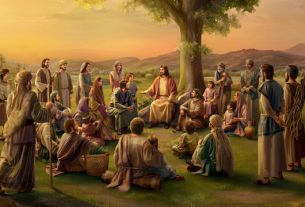Jesus Feeds the Five Thousand
(John 6:8-13) One of his disciples, Andrew, Simon Peter’s brother, said to him, There is a lad here, which has five barley loaves, and two small fishes: but what are they among so many? And Jesus said, Make the men sit down. Now there was much grass in the place. So the men sat down, in number about five thousand. And Jesus took the loaves; and when he had given thanks, he distributed to the disciples, and the disciples to them that were set down; and likewise of the fishes as much as they would. When they were filled, he said to his disciples, Gather up the fragments that remain, that nothing be lost. Therefore they gathered them together, and filled twelve baskets with the fragments of the five barley loaves, which remained over and above to them that had eaten.
First, let’s take a look at the first passage: Jesus Feeds the Five Thousand.
What sort of concept is “five loaves and two fish”? How many people would five loaves of bread and two fish usually be enough for? If you measure based on the appetite of an average person, it would only be enough for two people. This is the most basic concept of five loaves and two fish. However, it’s written in this passage that five loaves and two fish fed how many people? It’s recorded in the Scripture this way: “Now there was much grass in the place. So the men sat down, in number about five thousand.” Compared to five loaves and two fish, is five thousand a large number? What does it mean that this number is so large? From a human perspective, dividing five loaves and two fish between five thousand people would be impossible, because the difference between them is too great. Even if every person only had one tiny bite, it still wouldn’t be enough for five thousand people. But here, the Lord Jesus performed a miracle—He not only allowed five thousand people to eat their fill, but there was extra. The Scripture reads: “When they were filled, he said to his disciples, Gather up the fragments that remain, that nothing be lost. Therefore they gathered them together, and filled twelve baskets with the fragments of the five barley loaves, which remained over and above to them that had eaten.” This miracle allowed people to see the identity and status of the Lord Jesus, and it also allowed them to see that nothing is impossible for God—they saw the truth of God’s omnipotence. Five loaves and two fish were enough to feed five thousand, but if there hadn’t been any food would God have been able to feed five thousand people? Of course He could have! This was a miracle, so inevitably people felt this was incomprehensible and felt it was incredible and mysterious, but for God, doing such a thing was nothing. Since this was something ordinary for God, why would it be singled out for interpretation? Because what lies behind this miracle contains the Lord Jesus’ will, which has never been discovered by mankind.
First, let’s try to understand what type of people these five thousand were. Were they followers of the Lord Jesus? From the Scripture, we know that they were not His followers. Did they know who the Lord Jesus was? Definitely not! At the very least, they didn’t know that the person standing in front of them was Christ, or maybe some people only knew what His name was, and knew something or had heard something about things He had done. They were merely curious about the Lord Jesus from the stories, but you certainly couldn’t say they followed Him, much less understood Him. When the Lord Jesus saw these five thousand people, they were hungry and could only think of eating their fill, so it was in this context that the Lord Jesus satisfied their wishes. When He satisfied their wishes, what was in His heart? What was His attitude toward these people that only wanted to eat their fill? At this time, the Lord Jesus’ thoughts and His attitude had to do with God’s disposition and essence. Facing these five thousand people with empty stomachs who only wanted to eat a full meal, facing these people full of curiosity and hopes about Him, the Lord Jesus only thought of utilizing this miracle to bestow grace upon them. However, He did not get His hopes up that they would become His followers, for He knew that they just wanted to get in on the fun and to eat their fill, so He made the best of what He had there, and used five loaves of bread and two fish to feed five thousand people. He opened the eyes of these people who enjoyed entertainment, who wanted to see miracles, and they saw with their own eyes the things that God incarnate could complete. Although the Lord Jesus used something tangible to satisfy their curiosity, He already knew in His heart that these five thousand people just wanted to have a good meal, so He didn’t say anything at all or preach to them at all—He just let them see this miracle occur. He absolutely could not treat these people the same as He treated His disciples who truly followed Him, but in God’s heart, all creatures were under His rule, and He would allow all creatures in His sight to enjoy the grace of God when it was necessary. Even though these people did not know who He was or understand Him, or have any particular impression of Him or gratitude toward Him even after they had eaten the loaves and fish, this wasn’t something that God took issue with—He gave these people a wonderful opportunity to enjoy the grace of God. Some people say that God is principled in what He does, and He does not watch over or protect non-believers, and He especially does not allow them to enjoy His grace. Is that actually the case? In God’s eyes, as long as they are living creatures that He Himself created, He will manage and care for them; He will treat them, plan for them, and rule them in different ways. These are the thoughts and attitude of God toward all things.
Although the five thousand people who ate the loaves of bread and the fish did not plan to follow the Lord Jesus, He was not strict with them; once they had eaten their fill, do you know what the Lord Jesus did? Did He preach anything to them? Where did He go after doing this? The Scripture does not record that the Lord Jesus said anything to them; when He had completed His miracle He quietly left. So did He make any requirements of these people? Was there any hatred? There were none of these—He just no longer wanted to pay any mind to these people who could not follow Him, and at this time His heart was in pain. Because He had seen the depravity of mankind and He had felt mankind’s rejection of Him, and when He saw these people or He was with them, human obtuseness and ignorance made Him very sad and left His heart in pain, so He only wanted to leave these people as quickly as possible. The Lord didn’t have any requirements of them in His heart, He did not want to pay them any mind, He particularly did not want to expend His energy on them, and He knew they could not follow Him—in spite of all this, His attitude toward them was still very clear. He just wanted to treat them kindly, to bestow them with grace—this was God’s attitude toward every creature under His rule: for every creature, treat them kindly, provide for them, nourish them. For the very reason that the Lord Jesus was God incarnate, He very naturally revealed God’s own essence and treated these people kindly. He treated them kindly with a heart of mercy and tolerance. No matter how these people saw the Lord Jesus, and no matter what kind of outcome there would be, He just treated every creature based on His position as the Lord of all creation. What He revealed was, without exception, God’s disposition, and what He has and is. So the Lord Jesus quietly did something, then quietly left—what aspect of God’s disposition is this? Could you say that this is God’s lovingkindness? Could you say that God is selfless? Could a regular person do this? Definitely not! In essence, who were these five thousand people that the Lord Jesus fed with five loaves and two fish? Could you say that they were people who were compatible with Him? Could you say that they were all hostile to God? It can be said with certainty that they absolutely were not compatible with the Lord, and their essence was absolutely hostile to God. But how did God treat them? He used a method to defuse people’s hostility toward God—this method is called “kindness.” That is, although the Lord Jesus saw them as sinners, in God’s eyes they were nevertheless His creation, so He still treated these sinners kindly. This is God’s tolerance, and this tolerance is determined by God’s own identity and essence. So, this is something that no human created by God can do—only God can do this.
When you are able to truly appreciate God’s thoughts and attitude toward mankind, when you can truly understand God’s emotions and concern toward each creature, you will be able to understand the devotion and the love spent on every single one of the people created by the Creator. When this happens, you will use two words to describe God’s love—what are those two words? Some people say “selfless,” and some people say “philanthropic.” Of these two, “philanthropic” is the word least suited to describe God’s love. This is a word that people use to describe a person’s broad-minded thoughts and feelings. I really loathe this word, because it refers to dispensing charity at random, indiscriminately, regardless of any principles. It is an overly emotional expression of foolish and confused people. When this word is used to describe God’s love, there is inevitably a blasphemous intention. I have two words that more aptly describe God’s love—what are those two words? The first one is “immense.” Isn’t this word very evocative? The second is “vast.” There’s real meaning behind these two words which I use to describe God’s love. Taken literally, “immense” describes a thing’s volume or capacity, but it doesn’t matter how big that thing is—it’s something that people can touch and see. This is because it exists, it’s not an abstract object, and it gives people the sense that is relatively accurate and practical. It doesn’t matter if you’re looking at it from a flat or a three-dimensional angle; you don’t need to imagine its existence, because it’s a thing that really exists. Even though using “immense” to describe God’s love can feel like it’s quantifying His love, however, it also gives the feeling that it’s unquantifiable. I say that God’s love can be quantified because His love is not a kind of non-entity, nor does it spring from any legend. Rather, it is something shared by all things under God’s rule, and it is something enjoyed by all creatures to varying degrees and from different perspectives. Although people can’t see it or touch it, this love brings sustenance and life to all things as it is revealed bit by bit in their lives, and they number and bear witness to every single moment spent basking in God’s love. I say that God’s love is unquantifiable because the mystery of God providing for and nourishing all things is something that is difficult for humans to fathom, as are God’s thoughts for all things, and particularly those for mankind. That is to say, no one knows the blood and tears the Creator has poured out for mankind. No one can comprehend, no one can understand the depth or weight of the love the Creator has for mankind, created with His own hands. Describing God’s love as “immense” is to help people appreciate and understand its breadth and the truth of its existence. It’s also so that people can more deeply comprehend the actual meaning of the word “Creator,” and so that people can gain a deeper understanding of the true meaning of the appellation “creation.” What does the word “vast” usually describe? It is generally used for the ocean or the universe, such as the vast universe, or the vast ocean. The expansiveness and quiet depth of the universe is beyond human understanding, and it’s something that captures man’s imaginations, that they are full of admiration for. Its mystery and profundity are within sight but beyond reach. When you think of the ocean, you think of its breadth—it looks limitless, and you can feel its mysteriousness and its inclusiveness. This is why I’ve used the word “vast” to describe God’s love. It’s to help people feel how precious it is, and feel the profound beauty of His love, and that the power of God’s love is infinite and extensive. It’s to help them feel the holiness of His love, and the dignity and unoffendableness of God that is revealed through His love. Now do you think “vast” is a suitable word for describing God’s love? Can God’s love live up to these two words, “immense” and “vast”? Absolutely! In human language, only these two words are relatively apt, are relatively close to describing God’s love. Don’t you think so? If I had you describe God’s love, would you use these two words? Most likely you couldn’t, because your understanding and appreciation of God’s love is limited to a flat perspective, and has not ascended to the height of three-dimensional space. So if I had you describe God’s love, you would feel that you lack the words; you would even be speechless. The two words that I’ve talked about today may be difficult for you to understand, or maybe you simply do not agree. This can only speak to the fact that your appreciation and understanding of God’s love is superficial and within a narrow scope. I’ve said before that God is selfless—you remember the word selfless. Could it be said that God’s love can only be described as selfless? Isn’t this too narrow of a scope? You should ponder this issue more in order to gain something from it.
The above is what we saw of God’s disposition and His essence from the first miracle. Even though it’s a story that people have read for several thousand years, it has a simple plot, and allows people to see a simple phenomenon, yet in this simple plot we can see something more valuable, which is God’s disposition and what He has and is. These things that He has and is represent God Himself, and are an expression of God’s own thoughts. When God expresses His thoughts, it’s an expression of His own voice. He hopes that there will be people who can understand Him, know Him and comprehend His will, and He hopes there will be people who can hear His voice and will be able to actively cooperate to satisfy His will. And these things that the Lord Jesus did were a silent expression of God.




